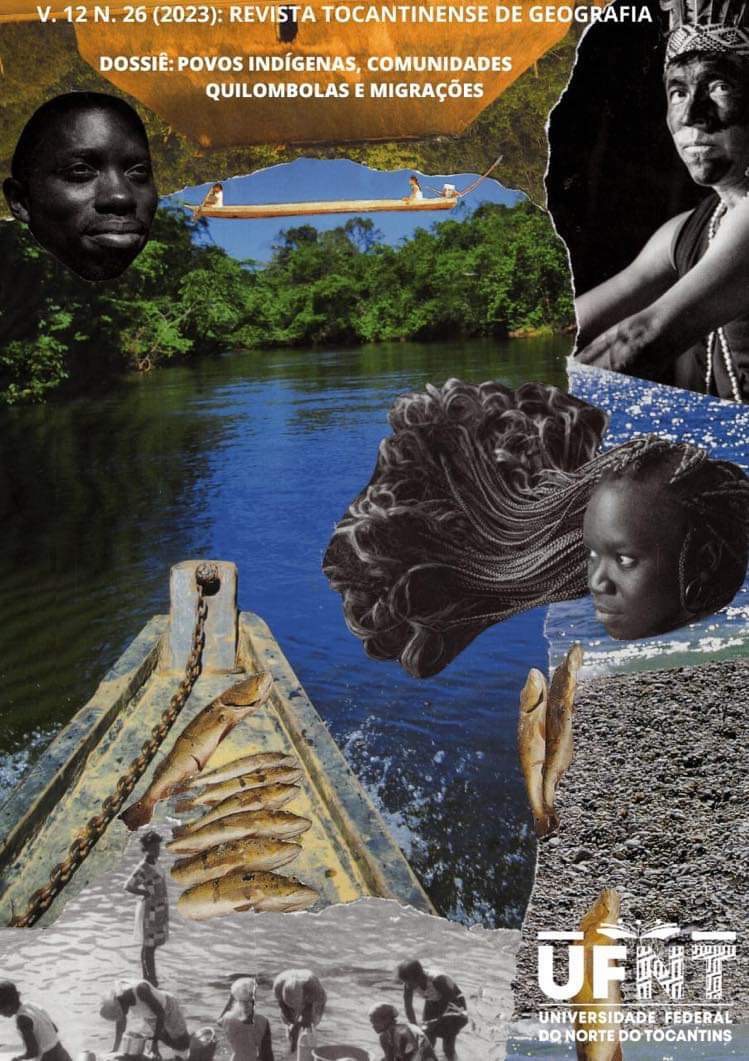L'ÉCOLE QUILOMBOLA L'ÉDUCATION ET L'ENSEIGNEMENT DE LA GÉOGRAPHIE À L'ÉCOLE PRIMAIRE DES ARAGUATINS (TO)
DOI :
https://doi.org/10.20873/rtg.v12i26.15170Mots-clés :
Ensino de geografia, Educação Escolar Quilombola, TerritórioRésumé
Les réflexions proposées ici visent à analyser l'Éducation Scolaire Quilombola (EEQ) dans l'Enseignement de la Géographie (EG) à l'École Primaire II, à l'Escola Municipal de Tempo Integral Prof.ª Nair Duarte (EMTIPND), à Araguatins-TO. Les démarches méthodologiques de la recherche ont impliqué une revue bibliographique et une recherche de terrain. La collecte de données a eu lieu en 2021 et comprenait l'application d'un questionnaire électronique, via Google Forms, et l'analyse des documents de la loi 10.639/03 et de la résolution n° 8/12. Avec le travail, il a été possible de vérifier que, même avec le soutien juridique visant à garantir le travail de l'éducation scolaire de Quilombola dans les espaces scolaires, son applicabilité est limitée, en raison de l'absence de politiques publiques dans la municipalité et d'un programme qui envisage les spécificités de l'enseignement quilombola et de la formation continue des enseignants. Il a également été constaté que l'EG à l'école est fragile, considérant que le professionnel qui enseigne les cours de géographie n'a pas de formation dans le domaine. De tels aspects rendent les pratiques pédagogiques de cette école peu cohérentes quant à l'interprétation du territoire quilombola en milieu scolaire.
Références
BRASIL. Presidência da República. Casa Civil. Lei nº 10.639, de 09 de janeiro de 2003. Altera a Lei no 9.394, de 20 de dezembro de 1996. Brasília, DF, 2003. Disponível em: < http://www.planalto.gov.br/ccivil_03/leis/2003/L10.639.htm >. Acesso em: 19 set. 2022
BRASIL. Ministério da Educação/Conselho Nacional de Educação/Câmara da Educação Básica. Resolução nº 8, de 20 de novembro de 2012. Brasília, DF: MEC/CNE/CEB. Disponível em: < https://normativasconselhos.mec.gov.br/normativa/view/CNE_RES_CNECEBN82012.pdf?query=ensino%20m%C3%A9dio >. Acesso: 24 set. 2022.
CALLAI, Helena Copetti. Educação geográfica: reflexão e prática. Ijuí: Ed. Unijuí, 2014.
CARRIL, Lourdes de Fátima Bezerra. Os desafios da educação quilombola no Brasil: o território como contexto e texto. Revista Brasileira de Educação v. 22 n. 69, p. 539-564, abr. /jun. 2017. Disponível em: < https://www.scielo.br/j/rbedu/a/L9vwgCcgBY6sF4KwMpdYcfK/?format=pdf&lang=pt >. Acesso em: 08 nov. 2022.
CASTROGIOVANNI et al, Antonio Carlos. Ensino de Geografia: práticas e textualizações no cotidiano. Porto Alegre: Mediação, 2000.
CASTILHO, Suely Dulce de; SANTOS, Silvana Alves dos. O saber docente experiencial e sua importância para a Educação Escolar Quilombola. Educação em Debate. Fortaleza, ano 41, n. 79, p 93-109, maio/ag. 2019. Disponível em: < https://repositorio.ufc.br/bitstream/riufc/47170/1/2019_art_sdcastilho.pdf >. Acesso em: 08 nov. 2022.
CAVALCANTE, Lana de Souza. Geografia, escola e construção de conhecimento. 16ª ed. São Paulo: Papirus, 2010.
NASCIMENTO, Lisângela Kati do. Educação Escolar Quilombola: Reflexões sobre os avanços das políticas educacionais e os desafios para a prática pedagógica no Vale do Ribeira-Sp. Rev. FAEEBA – Ed. e Contemp., Salvador, v. 26, n. 49, p. 69-86, maio/ago. 2017. Disponível em: < http://educa.fcc.org.br/scielo.php?script=sci_abstract&pid=S0104-70432017000200069&lng=pt&nrm=iso >. Acesso em: 08 nov. 2022.
OLIVEIRA, Andressa Rodrigues Sensato; SILVA, Carla Holanda. Território, Territorialidade e Identidade territorial: categorias para análise da dinâmica territorial quilombola no cenário geográfico. Caderno de Geografia. V. 27, n. 47, p. 411-426, 2017. Disponível em: < http://periodicos.pucminas.br/index.php/geografia/article/view/p.2318-2962.2017v27n49p411 >. Acesso em: 08 nov. 2022.
SANTOS, Robson Alves dos et al. A Educação Escolar Quilombola e o Ensino de Geografia em Vila Nova Jutaí – Breu Branco – Pa. GEOgraphia, vol: 24, n. 52, p. 1-21, 2022. Disponível em: < https://periodicos.uff.br/geographia/article/view/49936 >. Acesso em: 08 nov. 2022.
SANTOS, Renato Emerso dos. O ensino de geografia do Brasil e as relações raciais: reflexões a partir da Lei 10.639/03. Belo Horizonte: Autêntica, 2007.
SANTOS, Renato Emerso dos. Lei 10.639 e o Ensino de Geografia: Construindo uma agenda de pesquisa-ação. Tamoios. Ano 7, n 1, p. 4-24, 2011. Disponível em: < https://www.e-publicacoes.uerj.br/index.php/tamoios/article/view/1702/2995 >. Acesso em: 08 nov. 2022.
SANTOS, João Almeida dos; COSTA, Candida Soares da. Territórios Quilombolas e o Ensino de Geografia. Ciência Geográfica - Bauru - XXIV - Vol. XXIV- (1), p. 305-321, jan./dez., 2020. Disponível em: < https://www.agbbauru.org.br/publicacoes/revista/anoXXIV_1/agb_xxiv_1_web/agb_xxiv_1-23.pdf >. Acesso em: 08 nov. 2022.
Téléchargements
Publié-e
Comment citer
Numéro
Rubrique
Licence
© Journal de géographie Tocantinense 2023

Cette œuvre est sous licence Creative Commons Attribution - Pas d'Utilisation Commerciale - Pas de Modification 4.0 International.
Revista Tocantinense de Geografia ne rémunère aucun auteur pour la publication de ses textes. Le contenu des textes publiés dans cette revue relève de la responsabilité des auteurs.









.png)












